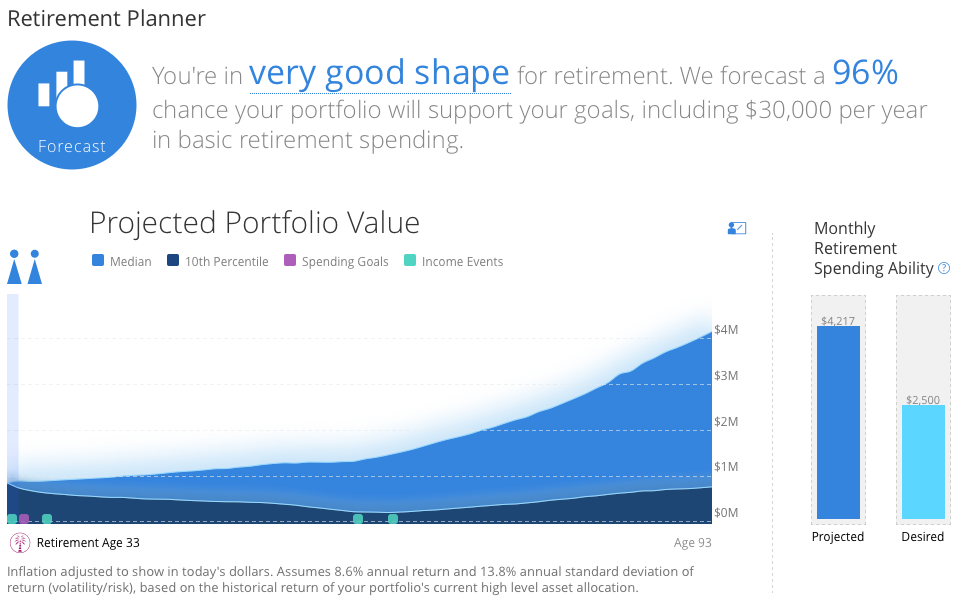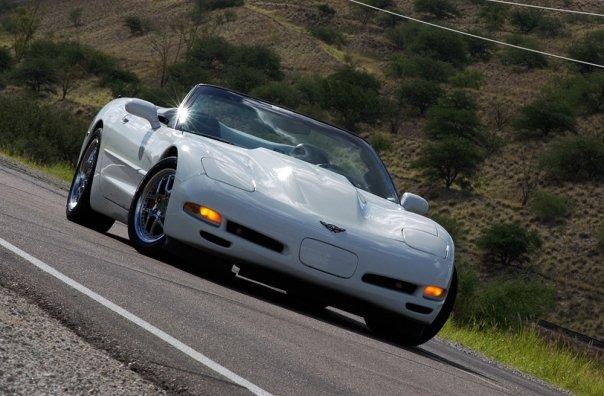How do normal people get rich and become millionaires?
How do normal people get rich and become millionaires? Most of us are "normal", but getting rich isn't tough. It just takes time. Here's how.

I've made it no secret that I was brought up in a supportive and loving family. I never had to struggle, nor did I ever wonder where my next meal was coming from. And, I'll just come right out and say it: My upbringing was top-notch, and that has a lot to do with my ability to retire this early.
But other than my upbringing, I consider myself a normal person.
I never got good grades. In fact, I suffered from what the Fairfax County Public Schools system labeled a "learning disability" going through grade school.
I struggled with math. And, I always needed extra time to learn concepts when the rest of my classmates seemed to breeze through the material.
Though I'm the king of self-deprecating humor, I know that I'm not dumb. But, that doesn't mean I'm naturally gifted, either.
Frankly, I'm not.
How does a relatively average person like me, who made virtually every mistake in the book, still grow up to retire at 35 and continuously flirt with that million dollar number?

5 ways normal people get rich and become millionaires
Over the past several weeks, I've given this a great deal of thought. How did I manage to accumulate as much as I did and retire early without being what I'd consider a "smart cookie" or naturally gifted?
1: I had a positive upbringing
There is just no doubt that my upbringing in a loving and uplifting family made a huge difference in my life. Instead of struggling throughout my childhood, I got to be a kid instead.
I got to play outside in pick-up sports games. Have sleepovers. Get into trouble...all without much worry about what was going on at home.
We don’t represent your typical “rags to riches” story. Both of our parents, however, came from very modest backgrounds. My dad worked his way up through the military by earning two masters degrees and joining the private sector in the 90s. He’s one of the hardest workers I’ve ever met.
And, part of what my parents did was instill within me a work ethic that drove me forward from the very beginning. They taught me to fend for myself and to expect nothing. When things go wrong, it's because I didn't do enough to prevent it.
It was damn frustrating at the time, but my childhood prepared me for the realities of life. No trophies for coming in sixth place.
My upbringing did several things that I consider crucial:
- I got to focus on being a kid rather than home-life problems
- Going to college was never optional for me; it was expected
- No student loans to speak of; my dad didn't want me to start life in debt
- My first job, thanks to my dad, brought in $55,000 a year, which marks a relatively high starting salary on which to build throughout my career
2: I invested from the very beginning
One of the first things I did when I scored my first professional job was to open up a 401k and Roth IRA. Though I didn't max out my retirement contributions until the last two or three years of my career, I always contributed at least the matched amount, which was generally 4%.
That meant that by the time my wife and I decided to call it quits early, we had several hundred thousand dollars already saved from years of working in the technology sector, which pays extremely well.
My 401k had an amazing impact in my life:
- It started my retirement savings in my early 20's
- And, it got me comfortable with living on slightly less than I made
- By the end, it added several hundred thousand to our net worth
The earlier that we start our savings regimen, the faster we build wealth and, eventually, get rich. Yup, it's the magic of compound interest.
Compound interest is better than gravity.

Luckily, I started early, and this again was due in large part to my upbringing. My dad stressed the importance of saving because he saw first-hand the influence that it can have.
3: I never let someone else manage my money
Although this doesn't necessarily mean that this never works, I always took an active role in my retirement and general investment picture.
Also, I lived by a few basic money principles:
- I never day-trade or attempt to time the market
- I never invest in individual companies
- I always choose diversified targeted retirement or life strategy funds
I always knew that I lacked a genuine love for math and money, and therefore, I didn't let someone else control my money because there was no way for me to check his or her work.
In other words, I wouldn't know whether or not the advice I was given was at all useful or smart. I refused to blindly follow advice about something as important as money and my retirement.
Instead, I chose to invest in funds that were automatically diversified for me. I kept things as basic as possible.
I don't like over complication.
4: I gave my money purpose
This is the most critical element in getting rich.
For so many years of my life, my money had no purpose. And, that's ultimately why I plopped down my first year's salary to buy a Corvette. And why I bought a house at the height of the real estate market.
And, why I was barely getting any richer, even earning a high-income, because I spent the majority of what I earned.

I had a problem – but it wasn’t a spending problem.
The root of the problem was my money had no purpose. No reason for sitting in my bank account. No earmark. It just sat there, available. Crisp and smelling like success. I wasn’t doing anything else with it.
Why not spend it?
Have you ever heard the phrase “We fill the space we have”? It means that if we buy larger homes, we tend to fill those spaces with stuff – whether we actually need that stuff or not. If we buy smaller homes, we fill it with less stuff. In other words, we don’t need most of the stuff we have.
In the same vein, we spend the money we have. If it’s there, we spend. It’s fun. Especially if it is not earmarked for something bigger and better.
…especially if it has no purpose.
Eventually, I found the purpose for my money. That purpose was quitting the rat race and retiring early. My wife and I were set and determined to make that happened, and almost instantly, that purpose curbed my spending habits.
We did things like:
- Stopped upgrading our damn cell phones
- Canceled cable television
- Sold cars that we didn't need
- Discussed every single purchase
Though a wholesale shift in your spending habits definitely isn't easy, it's also not exactly difficult. You know what you have to do.
5: We stopped paying attention to advertising
You might be surprised at how much of our spending is based on the advertisements that we see and hear. We may not actively and consciously recognize the connection, but for most of us, it's there.
None of us are immune to ads!
Most of us know the effect those ads have. They tickle our buying bones. They convince us we need this or that. At the end of each year, companies pay big bucks to get new commercials in front of us to get us to spend those year-end bonuses and raises – sometimes before we even get them.
How did we reduce our attention to ads?
We stopped watching TV – Easier said than done, right? Yup, it can be. Though, my wife and I haven’t owned a TV in years (yup, seriously!). No television. Nada. Sorry, Sony. Or Panasonic.
But, that doesn’t mean we don’t watch any entertainment. We do, but we don’t use television to do it. Instead, we stream the large majority of the shows that we watch using services like YouTube, Netflix and Hulu. Okay, I get that some programs use clever product-placement to subliminally advertise straight from within programs and movies. To remove exposure to those things, we’ll need to stop watching entertainment altogether.
We almost never go to malls – I know, malls are super easy. Everything is just right there. Trust me, I get it. However, malls are also chalk-full of ads and imagery throughout the entire place that most of us can’t help ourselves but peak into different stores along the way.
Amazon.com is kinda the same way. It’s an online mall. Do you know how much money you've spent at Amazon? It could be a scary number.
Instead, try shopping at other stores that are outside of malls to reduce the temptation to duck into other stores…you know, just to “look around”. Make it tougher and more inconvenient for you to shop more. Also, consider shopping locally and supporting local merchants if you can. Those stores will always be independent and separated from larger commercial centers and malls, and you’ll probably get a higher quality product, too.
We've tried making our own stuff – This isn’t just about saving money. Making your own stuff can reduce your exposure to advertising because your mind is fixated on something entirely different. You’re thinking about the ingredients and process of making something rather than just buying it already made – probably from India or China.
Your innate skills have value. But, how many of us are using those skills to make things for ourselves? Some are, but most aren't.
We almost never buy new – I’ve become a huge believer in buying used products over new, especially with high depreciation items like cars and electronics. Not only are you saving money by letting someone else pay for the cost of depreciation, but you are also removing the temptation that we get whenever we’re in the market for brand-spanking-new stuff.
Looking for a camera? Buy used and save hundreds (or thousands) through eBay.com or – my personal favorite – keh.com. Cars? Definitely, buy used. New cars lose an incredible amount of value the second they are driven off the lot. Even clothes. Books. Computer equipment. Whenever possible, pick things up second-hand after depreciation has already taken its toll.
Live sensibly – Just cut down on the number of things you have. Seriously, it works. Before moving into our Airstream, my wife and I sold both of our homes and the vast majority of our possessions. As a result, we live a lifestyle that many would consider minimalist, but I don’t like that term.
Here's a challenge: Try cutting out television for an entire week. Instead, get your entertainment through mediums like YouTube or Netflix. While there are ads on YouTube, they are easy to dismiss. Focus on the content. And, you might be surprised that 30-minute television shows only have about 15 or 20 minutes of actual show. Nearly half of that time slot are ads!
Okay, let's hear it: Do you consider yourself normal and rich? If so, how'd you get that way?


